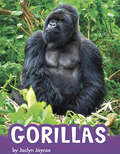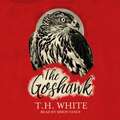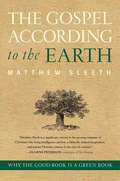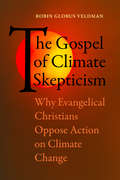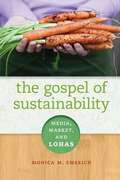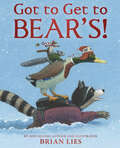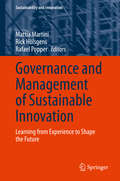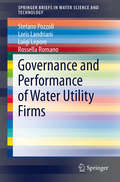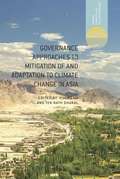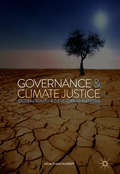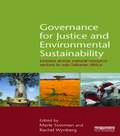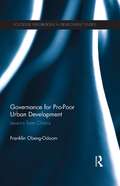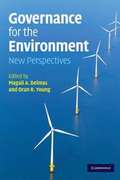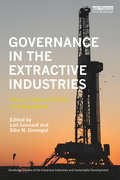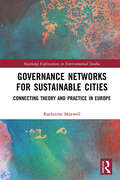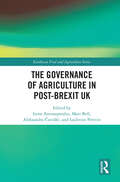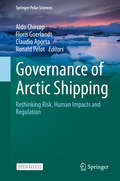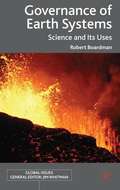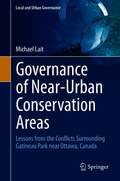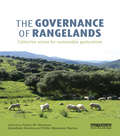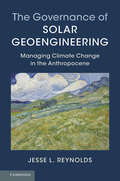- Table View
- List View
Gorillas (Animals)
by Jaclyn JaycoxGorillas are the largest primates in the world! These gentle mammals roam through the jungle, living in big groups as they search for fruit and bamboo shoots to eat. Climb through the trees to learn all about these strong, social primates.
Gorillas: Natural History and Conservation
by Kelly J. StewartGorillas covers the characteristics (life history, group life, reproduction, mortality) and ecology of these creatures. Stewart also discusses the serious threats that gorillas face, and informs readers about what can be done to protect gorillas.
Gorillas in the Mist
by Dian FosseyDian Fossey's classic account of four gorilla families - one of the most important books ever written about our connection to the natural worldFor thirteen years Dian Fossey lived and worked with Uncle Bert, Flossie, Beethoven, Pantsy and Digit in the remote rain forests of the volcanic Virunga Mountains in Africa, establishing an unprecedented relationship with these shy and affectionate beasts.In her base camp, 10,000 feet above sea-level, she struggled daily with rain, loneliness and the ever-constant threat of poachers who slaughtered her beloved gorillas with horrifying ferocity. African adventure, personal quest and scientific study, GORILLAS IN THE MIST is a unique and intimate glimpse into a vanishing world and a vanishing species.
Gory Details: Adventures From The Dark Side Of Science
by Erika EngelhauptUsing humour and real science in the tradition of Mary Roach, this groovy narrative from the author of National Geographic's popular Gory Details blog illuminates the gross, strange, morbid, and outright absurd realities of our bodies, our earth, and our universe. Filled to the brim with far-out facts, this wacky, funny, and informative narrative takes us on a fascinating journey through the astonishing world of science. With Erika Engelhaupt, founding editor of National Geographic's Gory Details blog, as your guide, all your weirdest and wildest fascinations will be illuminated. From the biologist who endured countless honeybee stings to test which spot was the most painful to the dollhouse-sized replicas of crime scenes built to analyze blood splatter to NASA's enduring dilemma--do women need to have their periods in space?--this entertaining book explores oft-ignored but alluring facets of biology, anatomy, space exploration, nature, and more. Featuring top-notch reporting, interviews with leading researchers in the field, and a healthy dose of wit, Gory Details depicts the world's most intriguing real-world applications of science in all their glory--making geekiness cool all over again!
The Goshawk: With a new foreword by Helen Macdonald
by T. H. White'No hawk can be a pet. There is no sentimentality. In a way, it is the psychiatrist's art. One is matching one's mind against another mind with deadly reason and interest. One desires no transference of affection, demands no ignoble homage or gratitude. It is a tonic for the less forthright savagery of the human heart.'First published in 1951, T.H. White's memoir describes with searing honesty his attempt to train a wild goshawk, a notoriously difficult bird to master. With no previous experience and only a few hopelessly out-of-date books on falconry as a guide, he set about trying to bend the will of his young bird Gos to his own. Suffering setback after setback, the solitary and troubled White nonetheless found himself obsessively attached to the animal he hoped would one day set him free.Read by Simon Vance(p) 2015 Blackstone Audio
The Gospel According to the Earth
by Matthew Sleeth"God saw everything that he had made, and indeed, it was very good." -Genesis 1:31 As an emergency room doctor, Matthew Sleeth saw a disturbing increase in asthma, autoimmune diseases, cancers, and other environmentally related health issues. Although he considered himself an environmentalist, he lacked the commitment to do anything about it. One slow night in the ER, Sleeth picked up a Gideon's Bible in the waiting room. Although raised in a Christian home, he had long ago abandoned his childhood beliefs. Reading the gospels that night, Sleeth became a Christian, and to his shock, he began to uncover in the Scriptures an enormous wealth of environmental answers that he had been seeking. As a result, his family took an account of their lifestyle, drastically reduced their reliance on electricity and fossil fuels, and began sharing their inspirational journey with others. Here, Sleeth invites you on his family's journey as they realize that one cannot be a Christian without recognizing the Bible's call to care for God's creation. From Genesis to Revelation, the Bible is filled with instructions on how we can demonstrate our love for the Creator by caring for the earth. Sleeth leads us on a highly creative journey through Scripture, visiting some of the most important characters in the Bible and discovering what they can teach us about issues such as stewardship, caring for our neighbors, climate change, and pollution. Adam and Eve in the Garden of Eden teach us the importance of physical work in relation to discovering fulfillment and a sense of human purpose, the prophet Daniel calls us to question our dietary habits, and the story of Noah addresses key issues for life on earth: how do we relate to the Creator, to others in the human community, and to the rest of the natural world? With passion and faith, Sleeth provides a new green lens through which we can read the Bible to discover answers to our biggest questions about the environment and how to care for it.
The Gospel of Climate Skepticism: Why Evangelical Christians Oppose Action on Climate Change
by Robin Globus VeldmanWhy are white evangelicals the most skeptical major religious group in America regarding climate change? Previous scholarship has pointed to cognitive factors such as conservative politics, anti-science attitudes, aversion to big government, and theology. Drawing on qualitative fieldwork, The Gospel of Climate Skepticism reveals the extent to which climate skepticism and anti-environmentalism have in fact become embedded in the social world of many conservative evangelicals. Rejecting the common assumption that evangelicals’ skepticism is simply a side effect of political or theological conservatism, the book further shows that between 2006 and 2015, leaders and pundits associated with the Christian Right widely promoted skepticism as the biblical position on climate change. The Gospel of Climate Skepticism offers a compelling portrait of how during a critical period of recent history, political and religious interests intersected to prevent evangelicals from offering a unified voice in support of legislative action to address climate change.
The Gospel of Sustainability: Media, Market and LOHAS
by Monica M. EmerichFrom organic produce and clothing to socially conscious investing and eco-tourism, the lifestyles of health and sustainability, or LOHAS, movement encompasses diverse products and practices intended to contribute to a more sustainable lifestyle for people and the planet. In The Gospel of Sustainability, Monica M. Emerich explores the contemporary spiritual expression of this green cultural shift at the confluence of the media and the market. This is the first book to qualitatively study the LOHAS marketplace and the development of a discourse of sustainability of the self and the social and natural worlds. Emerich draws on myriad sources related to the notions of mindful consumption found throughout the LOHAS marketplace, including not just products and services but marketing materials, events, lectures, regulatory policies, and conversations with leaders and consumers. These disparate texts, she argues, universally project a spiritual message about personal and planetary health that is in turn reforming capitalism by making consumers more conscious.
Got to Get to Bear's!
by Brian LiesBear never asks for anything. So when a letter arrives for the little chipmunk Izzy, urgently requesting her presence, she can&’t refuse—even if there is a blizzard on the way! This heartwarming tale of friendship from bestselling author Brian Lies will melt even the chilliest of hearts. Bear never asks for anything. So when she sends a note to Izzy urgently requesting her presence, Izzy can&’t refuse! But a blizzard begins and slows Izzy's progress. As the snow accumulates, so do her friends, helping her on her way to Bear&’s place. This heartwarming tale from best-selling author and illustrator Brian Lies shows readers the rewards of counting on friends to get you through, snowstorm or not.
Gotham Unbound
by Ted SteinbergThis is the story of the monumental struggle between New York and the natural world. From Henry Hudson's discovery of Mannahatta to Hurricane Sandy, Gotham Unbound is Ted Steinberg's sweeping ecological history of one of the most man-made spots on earth.Here is a tale of "the world with us"--lots of us--a groundbreaking book that recounts the four-century history of how hundreds of square miles of open marshlands became home to six percent of the nation's population. Steinberg vividly brings a vanished New York back to life. You will see the metropolitan area anew, not just as a dense urban goliath but as an estuary once home to miles of oyster reefs, wolves, whales, and blueberry bog thickets. That world gave way to an onslaught managed by thousands, from Governor John Montgomerie, who turned water into land, and John Randel, who imposed a grid on Manhattan, to Robert Moses, Charles Urstadt, Donald Trump, and Michael Bloomberg. This book is a powerful account of the relentless development that New Yorkers wrought as they plunged headfirst into the floodplain and transformed untold amounts of salt marsh and shellfish beds into a land jam-packed with people, asphalt and steel, and the reeds and gulls that thrive among them. With metropolitan areas across the globe on a collision course with rising seas, Gotham Unbound is a penetrating history that helps explain how one of the most important cities in the world wound up in such a perilous situation.
Governance and Management of Sustainable Innovation: Learning from Experience to Shape the Future (Sustainability and Innovation)
by Mattia Martini Rick Hölsgens Rafael PopperSustainable innovation (SI) is considered to be a key driver of societal progress in an era of enormous economic, environmental and societal challenges, and the uncertainties and future consequences that come with them. This book provides evidence, insights and reflections related to specific issues of governance, the management of sustainable innovation and applying a multi-level, multi-stakeholder approach to sustainable innovation analysis. Building on the European Commission (EU) funded research project “Public Participation in Developing a Common Framework for the Assessment and Management of Sustainable innovation” (CASI), it presents tools for assessing and managing sustainable innovation, and reflects on SI-related policies as well as citizens’ aspirations. The book is intended for scholars in the field of sustainable innovation, as well as to policymakers, innovators, students and citizens.
Governance and Performance of Water Utility Firms
by Stefano Pozzoli Loris Landriani Luigi Lepore Rossella RomanoIn Italy, the debate about the reform process, that has involved the water sector for several years, cannot be considered concluded. It seems exclusively ideological and often it does not consider the business administration perspective, which certainly could make a contribution to the solution of different problems. Politicians and researchers, for example, show very little interest for the economic and financial performance of water utility firms, focusing almost exclusively on the different ways for providing the services or on the ownership structure. This work analyzes the variables characterizing the outsourcing process in the water sector. It also explores the connection of such variables with the performance of companies and local government authorities involved in the delivery process. Subsequently, the work explains the results of an exploratory analysis of different cases in the international context, making also a comparison about the performance. Lastly, the work verifies the existence of some best practices and evaluates the adaptability of these best practices in the Italian context.
Governance Approaches to Mitigation of and Adaptation to Climate Change in Asia
by Huong Ha Tek Nath DhakalAcademics and practitioners from across Asia and beyond revisit the issues and impact of climate change in Asia. They examine the preconditions for good governance regarding climate change, and the role of state and non-state actors in climate change governance, and explore different political-legal frameworks.
Governance & Climate Justice: Global South & Developing Nations (Politics, Economics, And Inclusive Development Ser.)
by Julia PuaschunderThis book examines international climate change mitigation and adaptation regimes with the aim of proposing fair climate stability implementation strategies. Based on the current endeavors to finance climate change mitigation and adaptation around the world, the author introduces a 3-dimensional climate justice approach to share the benefits and burdens of climate change equitably within society, across the globe and over time.
Governance for Justice and Environmental Sustainability: Lessons across Natural Resource Sectors in Sub-Saharan Africa
by Rachel Wynberg Merle SowmanUnderstanding the governance of complex social-ecological systems is vital in a world faced with rapid environmental change, conflicts over dwindling natural resources, stark disparities between rich and poor and the crises of sustainability. Improved understanding is also essential to promote governance approaches that are underpinned by justice and equity principles and that aim to reduce inequality and benefit the most marginalised sectors of society. This book is concerned with enhancing the understanding of governance in relation to social justice and environmental sustainability across a range of natural resource sectors in Sub-Saharan Africa. By examining governance across various sectors, it reveals the main drivers that influence the nature of governance, the principles and norms that shape it, as well as the factors that constrain or enable achievement of justice and sustainability outcomes. The book also illuminates the complex relationships that exist between various governance actors at different scales, and the reality and challenge of plural legal systems in much of Sub-Saharan Africa. The book comprises 16 chapters, 12 of them case studies recounting experiences in the forest, wildlife, fisheries, conservation, mining and water sectors of diverse countries: Madagascar, Zimbabwe, Botswana, Namibia, South Africa, Zambia, Mozambique, Sierra Leone and Cameroon.Through insights from these studies, the book seeks to draw lessons from the praxis of natural resource governance in Sub-Saharan Africa and to contribute to debates on how governance can be strengthened and best configured to meet the needs of the poor, in a way that is both socially just and ecologically sustainable.
Governance for Pro-Poor Urban Development: Lessons from Ghana (Routledge Explorations in Development Studies)
by Franklin Obeng-OdoomThe world development institutions commonly present 'urban governance' as an antidote to the so-called 'urbanisation of poverty' and 'parasitic urbanism' in Africa. Governance for Pro-Poor Urban Development is a comprehensive and systematic analysis of the meaning, nature, and effects of 'urban governance' in theory and in practice, with a focus on Ghana, a country widely regarded as an island of good governance in the sub region. The book illustrates how diverse groups experience urban governance differently and contextualizes how this experience has worsened social differentiation in cities. This book will be of great interest to students, teachers, and researchers in development studies, and highly relevant to anyone with an interest in urban studies, geography, political economy, sociology, and African studies.
Governance for the Environment
by Magali A. Delmas Oran R. YoungWe live in an era of human-dominated ecosystems in which the demand for environmental governance is rising rapidly. At the same time, confidence in the capacity of governments to meet this demand is waning. How can we address the resultant governance deficit and achieve sustainable development? This book brings together perspectives from economics, management, and political science in order to identify innovative approaches to governance and bring them to bear on environmental issues. The authors' analysis of important cases demonstrates how governance systems need to fit their specific setting and how effective policies can be developed without relying exclusively on government. They argue that the future of environmental policies lies in coordinated systems that simultaneously engage actors located in the public sector, the private sector, and civil society. Governance for the Environment draws attention to cutting-edge questions for practitioners and analysts interested in environmental governance.
Governance in the Extractive Industries: Power, Cultural Politics and Regulation (Routledge Studies of the Extractive Industries and Sustainable Development)
by Lori Leonard Siba N. GrovoguiGreater understanding of the forms and consequences of investment and disinvestment in the extractive industries is required as a result of capitalist expansion, recent declines in global commodity prices, and claims that extractive sector projects, especially in the global south, are poverty reduction projects. This book explores emergent forms of governance in mining and extractive industry projects around the world. Chapters examine efforts to govern extractive activities across multiple political scales, through intermediaries, instruments, technologies, discourses, and infrastructures. The contributions analyse how multiple micro-processes of rule reverberate through societies to shape the material conditions of everyday life but also politics, social relations, and subjectivities in extractive economies. Detailed case studies are included from Africa (Chad, Nigeria, Rwanda, and São Tomé and Príncipe), Latin America (Bolivia, Ecuador, and Peru), and the UN Climate Conference.
Governance Networks for Sustainable Cities: Connecting Theory and Practice in Europe (Routledge Explorations in Environmental Studies)
by Katherine MaxwellThis book explores the effectiveness of governance networks on the design and implementation of sustainability strategies. European cities are actively developing sustainability strategies to address the impact of climate change. One recent approach many cities have taken is the creation of ‘governance networks’: groups of public, private and third sector organisations, which collaborate to support urban sustainability efforts. Drawing on two case studies in Glasgow and Copenhagen, this book explores the concept of governance networks in theory and practice, revealing how stakeholder collaboration, leadership and innovation within these networks can help or hinder the process. It also highlights the many benefits of these networks, including increased participation in the decision-making process, increased levels of resources and expertise on sustainability issues, as well as stakeholder buy-in for sustainability policies. This book provides recommendations for improving the efficiency of governance networks and will be of interest to academics and practitioners working in the areas of urban governance and sustainability.
The Governance of Agriculture in Post-Brexit UK (Earthscan Food and Agriculture)
by Irene Antonopoulos Matt Bell Aleksandra Čavoški Ludivine PetetinThis book provides a multidisciplinary analysis of the impact of Brexit on British agriculture and associated areas, discussing the Common Agricultural Policy and the Agriculture Act 2020. The Brexit referendum provoked new debates and questions over the future of agriculture in Britain and the potential positive and negative impacts of Brexit on both farmers and consumers. These debates, as well as the ensuing proposals relevant to the Agriculture Act 2020, have exposed the multidimensional effects of Brexit when it comes to agriculture. With a focus on profitability, the rights of farmers, environmental protection, as well as animal welfare, this book brings together an interdisciplinary analysis of the future of British agriculture in post-Brexit Britain. More specifically, it addresses the criticisms over the Common Agriculture Policy, presents an analysis of the Agriculture Act 2020, and considers suggestions for future developments. Through this analysis, the book suggests a way towards the future, with a positive outlook towards a competitive and sustainable agriculture that will satisfy the needs of farmers and consumers while ensuring environmental protection, animal welfare, and rural development. This book will be of great interest to students and scholars of food and agricultural policy and politics, agroecology and rural development, as well as policymakers involved in Britain’s post-Brexit environmental policy.
Governance of Arctic Shipping: Rethinking Risk, Human Impacts and Regulation (Springer Polar Sciences)
by Aldo Chircop Floris Goerlandt Claudio Aporta Ronald PelotThis open access book is a result of the Dalhousie-led research project Safe Navigation and Environment Protection, supported by a grant from the Ocean Frontier Institute’s the Canada First Research Excellent Fund (CFREF). The book focuses on Arctic shipping and investigates how ocean change and anthropogenic impacts affect our understanding of risk, policy, management and regulation for safe navigation, environment protection, conflict management between ocean uses, and protection of Indigenous peoples’ interests. A rapidly changing Arctic as a result of climate change and ice loss is rendering the North more accessible, providing new opportunities while producing impacts on the Arctic. The book explores ideas for enhanced governance of Arctic shipping through risk-based planning, marine spatial planning and scaling up shipping standards for safety, environment protection and public health.
Governance of Earth Systems: Science and Its Uses
by Robert BoardmanScience and politics are closely connected in today's global environmental issues. This book focuses on these links in relation to climate change, the threats to wildlife species, and natural hazards and disasters. Study of these reveals the need for more effective international cooperation and the limits of global governance.
Governance of Near-Urban Conservation Areas: Lessons from the Conflicts Surrounding Gatineau Park near Ottawa, Canada (Local and Urban Governance)
by Michael LaitThis book comprehensively describes the history of Gatineau Park, from the first proposals for a “national park” in the early 1900s to the governance issues in the present period, and it highlights the issues concerning the planning and governance of this unique near-urban ecological area. The 34,500-hectare Gatineau Park is an ecologically diverse wilderness area near the cities of Ottawa (Canada’s national capital) and Gatineau. Gatineau Park is planned and managed as the “Capital’s Conservation Park” by the federal government, specifically the National Capital Commission (NCC). This monograph examines numerous governmental and non-governmental actors that are engaged in the governance of a near-urban wilderness area. Unlike Canada’s national parks, Gatineau Park’s administration involves all three levels of government (federal, provincial, and four municipalities). This book is the first to document the relations among the public and private entities, and is one of only a handful of studies concerning the governance of Canada’s National Capital Region (NCR), which is relatively unique in the literature on federal capitals. Of particular interest to students of governance will be the examination of federal-provincial relations, as the Governments of Canada and Quebec have had a notoriously strained relationship. As the first governance study of Gatineau Park, the monograph will provide readers with insight into the significance of non-state actors, showing the range of competencies that public and private groups deploy in their negotiations with NCC planners, policymakers, park managers, local and federal politicians.
The Governance of Rangelands: Collective Action for Sustainable Pastoralism
by Pedro M. Herrera Jonathan Davies Pablo Manzano BaenaRangelands are large natural landscapes that can include grasslands, shrublands, savannahs and woodlands. They are greatly influenced by, and often dependent on, the action of herbivores. In the majority of rangelands the dominant herbivores are found in domestic herds that are managed by mobile pastoralists. Most pastoralists manage their rangelands communally, benefitting from the greater flexibility and seasonal resource access that common property regimes can offer. As this book shows, this creates a major challenge for governance and institutions. This work improves our understanding of the importance of governance, how it can be strengthened and the principles that underpin good governance, in order to prevent degradation of rangelands and ensure their sustainability. It describes the nature of governance at different levels: community governance, state governance, international governance, and the unique features of rangelands that demand collective action (issues of scale, ecological disequilibrium and seasonality). A series of country case studies is presented, drawn from a wide spectrum of examples from Africa, the Middle East, Central Asia, Europe and North America. These provide contrasting lessons which are summarised to promote improved governance of rangelands and pastoralist livelihoods.
The Governance of Solar Geoengineering: Managing Climate Change in the Anthropocene
by Jesse L. ReynoldsClimate change is among the world's most important problems, and solutions based on emission cuts or adapting to new climates remain elusive. One set of proposals receiving increasing attention among scientists and policymakers is 'solar geoengineering', (also known as solar radiation modification) which would reflect a small portion of incoming sunlight to reduce climate change. Evidence indicates that this could be effective, inexpensive, and technically feasible, but it poses environmental risks and social challenges. Governance will thus be crucial. In The Governance of Solar Geoengineering, Jesse L. Reynolds draws on law, political science, and economics to show how solar geoengineering is, could, and should be governed. The book considers states' incentives and behavior, international and national law, intellectual property, compensation for possible harm, and non-state governance. It also recommends how solar geoengineering could be responsibly researched, developed, and - if appropriate - used in ways that would improve human well-being and ensure sustainability.
